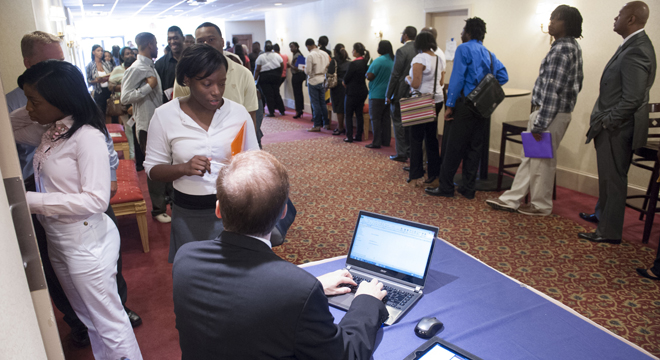Over the course of 2013, congressional Republicans consistently behaved as though tough economic times are just a sad tale of days gone by. The latest example of this occurred on Saturday when, at GOP insistence — and Democrats’ acquiescence — federal long-term unemployment benefits expired. The expiration was part of the budget deal Congress struck earlier in December, and will halt weekly $300 unemployment checks to more than 1 million U.S. workers who aren’t able to find work for more than six months.
In response to outrage over the cuts, some Democrats are now proposing a three-month extension of long-term unemployment benefits. Sen. Jack Reed (D-RI)’s proposed three-month extension would help many, though 12 weeks is probably still too short given economic indicators showing the severity of the long-term unemployment problem. To really help those who are struggling to find work, the Emergency Unemployment Compensation (EUC) program should stay in place through 2014, and supplemental programs that that guide these workers into jobs that pay also need to be part of the solution.
Pre-Great Recession, long-term unemployment benefits typically lasted 26 weeks. But as part of the post-recession, EUC benefits were extended up to 99 weeks. Congress decided in December to end the program. Like recent proposed food stamp cuts and the sequester, the end of the EUC was driven by Republicans, but ultimately agreed to by Democrats.
In an economy with adequate full-time job opportunities, ending the EUC might be a reasonable decision. But this is an economy that has 4 million long-term unemployed people, and even more who are underemployed.
Republicans like Sen. Rand Paul (R-KY) who advocate the end of EUC benefits argue that they discourage people from looking for a job. But as Danny Vinik of Business Insider aptly pointed out earlier in December, this argument is flawed for many reasons. People who receive benefits are required to show they are looking for work — and cutting benefits may actually discourage people from continuing in their job hunts. In addition, unemployment benefits are basically a small stipend of $300 per week on average — just above the poverty line.
Perhaps most troubling is how much harder it is for the long-term unemployed to find work. On Friday I spoke with Jamie Anderson, a 28-year-old Bay Area legal assistant. Anderson has a college degree. She has been tirelessly applying for jobs and giving numerous interviews since she was laid off on July 4. (Since she is still hunting for a job, Anderson asked that her real name be changed for this article.)
Come Feb. 1, Anderson’s unemployment benefits will run out. After that date, she has no idea how she will make payments on her student loans — she owes $10,000 — or on her car insurance bills.
“I don’t feel confident I’ll have enough income to pay the bills by Feb. 1,” Anderson told me. “I’m trying to figure out whose couch I’m going to sleep on. Unemployment pays me a lot less money than my last job, so I deferred my student loans so that I could pay my rent.”
Congress is not creating more opportunities for workers like Anderson. Rather — led by conservatives like Rand Paul – in ending the EUC, Congress is simply leaving workers drifting in an economy that has far too few prospects for finding enough work.
The unemployment insurance cuts that went into effect this week culminate a year of fights in Congress over various austerity measures — fights that Republicans have largely won, at least as the results indicate: the end of extensions to food stamp benefits, the government shutdown that cut millions of workers’ salaries for two weeks, and the year-long sequester that shaved off funding for programs like Women, Infants and Children (WIC) that offer nutrition and food assistance to the poor. And some Republican-led states, like North Carolina, have already cut their long-term unemployment benefits earlier this year. In the aggregate, these austerity measures will leave those who have been struggling the most in the Great Recession economically vulnerable even as the economy begins to pick up.
With the culture of austerity we’ve seeing flourish in Congress over the past year, the end of long-term unemployment benefits is not surprising — but it is a deeply misguided response to the unemployment crisis in the United States.
Sheila Bapat is an attorney and writer covering economic and gender justice. Her work has appeared in RH Reality Check, Salon, TruthOut, Jacobin and other publications.






